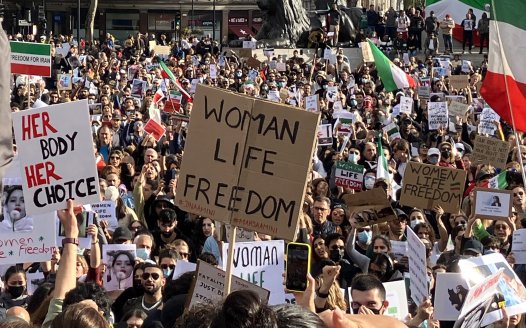Conquering fear with hope: Secularism 2014
Posted: Thu, 9th Oct 2014 by Gita Sahgal
Ahead of this weekend's conference on the Religious-Right, Secularism and Civil Rights, Gita Sahgal highlights the importance and bravery of secular activism in the Global South.
The issue of secularism is a controversial one in international human rights organisations. That, perhaps is why they do not always fully uphold universal values, the bedrock of their work.
Embedding secular values as fundamental to democracy is the work of activists, not the 'international community', the UN, international development or human rights organisations. As with women's rights, it is feminist activists and progressives who will force these issues on to the table. That is why the Secularism Conference 2014, is so important.
There are few other places where you can challenge the dominant narratives of the 'War on Terror' as a war for western values and democracy on the one hand, or a war on Islam and Muslims worldwide on the other. Yet this is a moment where no thinking person can limit their understanding to either of these views. In the brutal murder of Alan Henning, the British public have acquired a new 'British hero' and al-Quaeda supporters who argued for his release have their first non-jihadi martyr.
Post 9/11, the British state cosied up to the 'non-violent extremists', their term for the Jamaat e Islami and the Muslim Brotherhood. Now it seems that al-Queda might be the new cuddly. How to understand this turn of events is the theme of the conference: to hear about global secular struggles, old and new, and to learn from an enormous wealth of experience from people who have challenged governments, mobilised communities, and forced the recognition of forgotten genocides.
It is particularly important for human rights professionals and activists to take note of these points. In 2007, Amnesty International organized a public meeting at New York University, examining the issue of terrorism; and asking whether it should be treated as a human rights violation. I spoke at the meeting of the ways in which women across the world had experienced and challenged armed violence. I challenged the ennui that afflicts so many post-modernist and post-colonial theorists in their discussions of universality and human rights. For them, secularism is 'over', as Jacques Berlinerblau discussed in his piece on the crisis in secular studies.
I recalled the World Conference of Human Rights at Vienna in 1993, at which a panel consisting of groups such as Women Living Under Muslim Laws, Catholics for Free Choice and Women Against Fundamentalism had warned of the impact on women of the rise of violent religious fundamentalist movements across the world. We had criticised identity politics - often arising in oppressed minorities - and discussed the ways in which identity politics opened the way to the legitimisation of fundamentalism. States were often complicit or directly involved in this process. This panel was not abandoning the principle of universality. It was a foundational challenge to the way in which universality is constructed.
I asked my student audience: "Many of you will have engaged with academic and other debates about whether human rights are a western concept. Do they really apply across the world? If you had been present at those discussions at UN conferences fifteen long years ago, the answer would have been obvious to you. Women intervened in Vienna to influence the deliberations of states. But they didn't simply speak of their experiences - they fundamentally challenged both the theory and practice of the human rights movement as it was then understood in the west."
Amnesty International's public meeting in New York was based on a brilliant paper that Karima Bennoune had written at the direction of the Secretary General to improve their work on non-state violence. She argued that terrorism should be understood as an absolute prohibition by human rights movements, just as they regarded torture as an absolute prohibition under international human rights law. Her paper referenced the proposed definition in the UN Report of the High-level Panel on Threats, Challenges and Change, "A more secure world: Our shared responsibility," 2004. Paragraph 164 (d) of the report suggests that terrorism should be understood as, "any action, in addition to actions already specified by the existing conventions on aspects of terrorism, the Geneva Conventions and Security Council resolution 1566 (2004), that is intended to cause death or serious bodily harm to civilians or non-combatants, when the purpose of such act, by its nature or context, is to intimidate a population, or to compel a Government or an international organization to do or to abstain from doing any act."
The public meeting in New York was followed by a private round table on terrorism and human rights addressed by prominent human rights lawyers and feminist advocates, among them the Algerian sociologist, Marieme Hélie-Lucas. But you will look in vain among Amnesty International's documents for any mention of the meeting. Not a single page of recommendations emerged from the private round table. Amnesty International could have used the meeting to improve its work on terrorism, fundamentalism and armed groups, but it chose not to.
In an open letter in the New York Review of Books, several speakers at the forthcoming Secularism Conference in London, among them, Sultana Kamal, Fatow Sow, Fazun Zackarayia, along with my colleague, Meredith Tax, challenged Ken Roth of Human Rights Watch for his article embracing the rise of the Muslim Brotherhood to power in various states in the Middle East. In reply, Roth and his colleagues informed women with decades of human rights experience that, :Promoting tolerance of women and gays by way of intolerance for Islam, an approach epitomized by Geert Wilders of the Dutch Freedom Party, does not seem a productive approach." This kind of comment is depressingly familiar to activists who are speaking at the Conference. They are used to having their concerns loftily brushed aside, and to being lectured about the different kinds of Muslim fundamentalisms - which they face daily in their working lives.
In the early 1980s, Bandung File - a current affairs programme on Channel 4 TV, had exposed the funding given to organisations of the Hindu right by Labour Councils in Britain. The complaint was made by Asian councillors, and Ken Livingstone, then Leader of the Greater London Council, said that he would not have done it had he known they were fascists. Years later, he appeared to have forgotten this lesson, and Peter Tatchell was attacked for criticizing Livingstone for his - quite literal, embrace of Yusuf Qaradawi. Human Rights Watch was among those who attacked him (and later apologised).
Another concern Human Rights Watch dismissed, was the involvement of western security services in various forms of Muslim fundamentalism in the west, although the prominent position of so called 'non-violent extremists' in Britain has been well documented. One of them, Choudhury Muenuddin, was convicted in absentia by a Tribunal in Bangladesh for being part of a death squad in 1971. He had enjoyed huge state patronage in Britain, and has been called a friend by Prince Charles. As I argued in the Hecklers programme on BBC Radio 4, the policy of working with the nasty to catch the nastier, is likely to be ineffective. This form of 'soft' counter-terrorism, is a threat to civil liberties and human rights, just as torture and renditions are.
Human rights organisations have looked at some violations of human rights by the security services, but given their own views, they simply cannot afford to investigate the links between western states and fundamentalist and jihadi movements. Nor are they able to reflect on how their positions mirror those of Government officials. Jonathon Powell, advisor to Tony Blair and Elizabeth Manning Buller, former head of MI 5, have argued that governments must talk to terrorists. What they appear to mean is that the security of Britain can be managed by exporting the problem elsewhere. A combination of deportations and assurances from jihadis in the UK that they will not attack Britain under what they call the "covenant of security", does not keep millions in the rest of the world safe. I will be addressing these issues, which have become headline news with the collapse of the case against Moazzam Begg, at the Secularism conference.
Horia Mossadiq, a human rights defender from Afghanistan, can explain why there is no such thing as 'moderate ' Taliban, while the well-known Professor and anti-nuclear campaigner from Pakistan, Pervez Hoodbhoy, will explore the roots of the idea of the Islamic state. As the news media concentrates on Syria and Iraq, it is important not to forget the roots of the war on terror in the backing of terrorist violence by Pakistan and its security service, the ISI.
Few people are as qualified to explain the peculiar combination of extreme idealism and attraction to violence that we see in young European jihadis as former Naxalite, Dilip Simeon. In his wonderful novel, Revolution Highway, he describes how Maoists, while unsuccessfully trying to foment a mass revolt in India, missed giving support to the liberation struggle for Bangladesh taking place next door. Their Chinese masters, like Kissinger and Nixon, were on the side of Pakistan in its genocidal war against Bengalis. But the roots of Left's complicity with right wing Muslim conservatives go even further back. In his review essay on Meredith Tax's book, Double Bind: The Muslim Right, the Anglo American Left, and Universal Human Rights, for the influential Indian, left journal the Economic and Political Weekly, Sumanta Banerjee, also a former Naxalite, points out that the debate goes back as far as the 1920s, when Indian Marxist, MN Roy, "warned his Bolshevik comrades that the feudal landlords and priests who shaped the pan-Islamic ideology were basically counter-revolutionary in their beliefs and could never be trusted as allies of a socialist revolution". Ken Roth of Human Rights Watch disregarded this essential point when he told us "there is no internationally recognized right to separate religion from the state".
Speakers at the Secularism conference are on a journey to counter this idea, so common in human rights work, just as we have fought the London School of Economics on free speech, Universities UK on gender segregation, and the Law Society on gender equality. Some people have complained that attending this weekend's conference is very expensive, but funding has been hard to raise, with the result that tickets have to cover the costs. The conference will be worth the price of the ticket.
This is not simply an academic discussion or a policy review. This is history being made. Be part of it.
Gita Sahgal is an honorary associate of the NSS and a founder of the Centre for Secular Space, which opposes fundamentalism, amplifies secular voices and promotes universality in human rights.
This article first appeared on Open Democracy and is published under a Creative Commons Attribution-NonCommercial 3.0 licence. The views expressed are those of the author and do not necessary represent those of the NSS.







